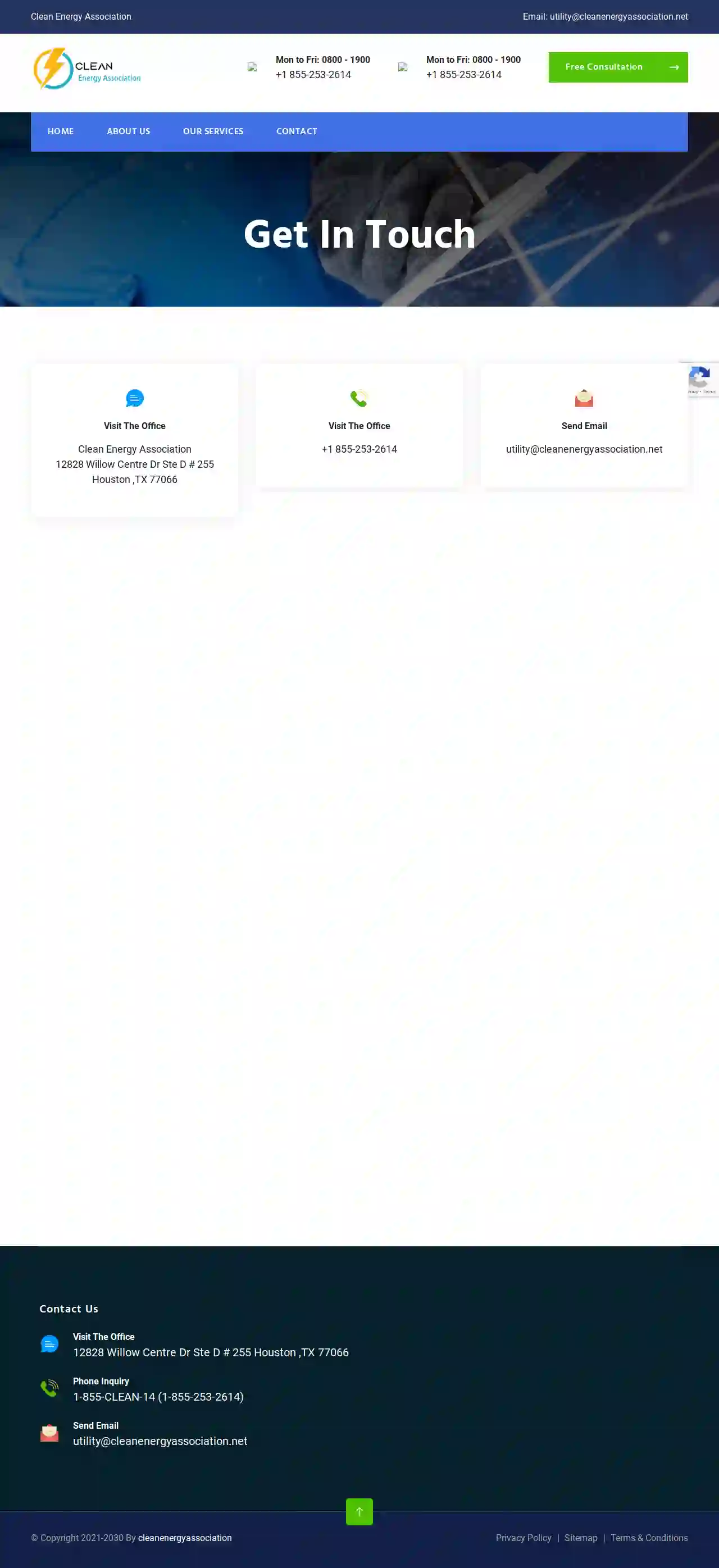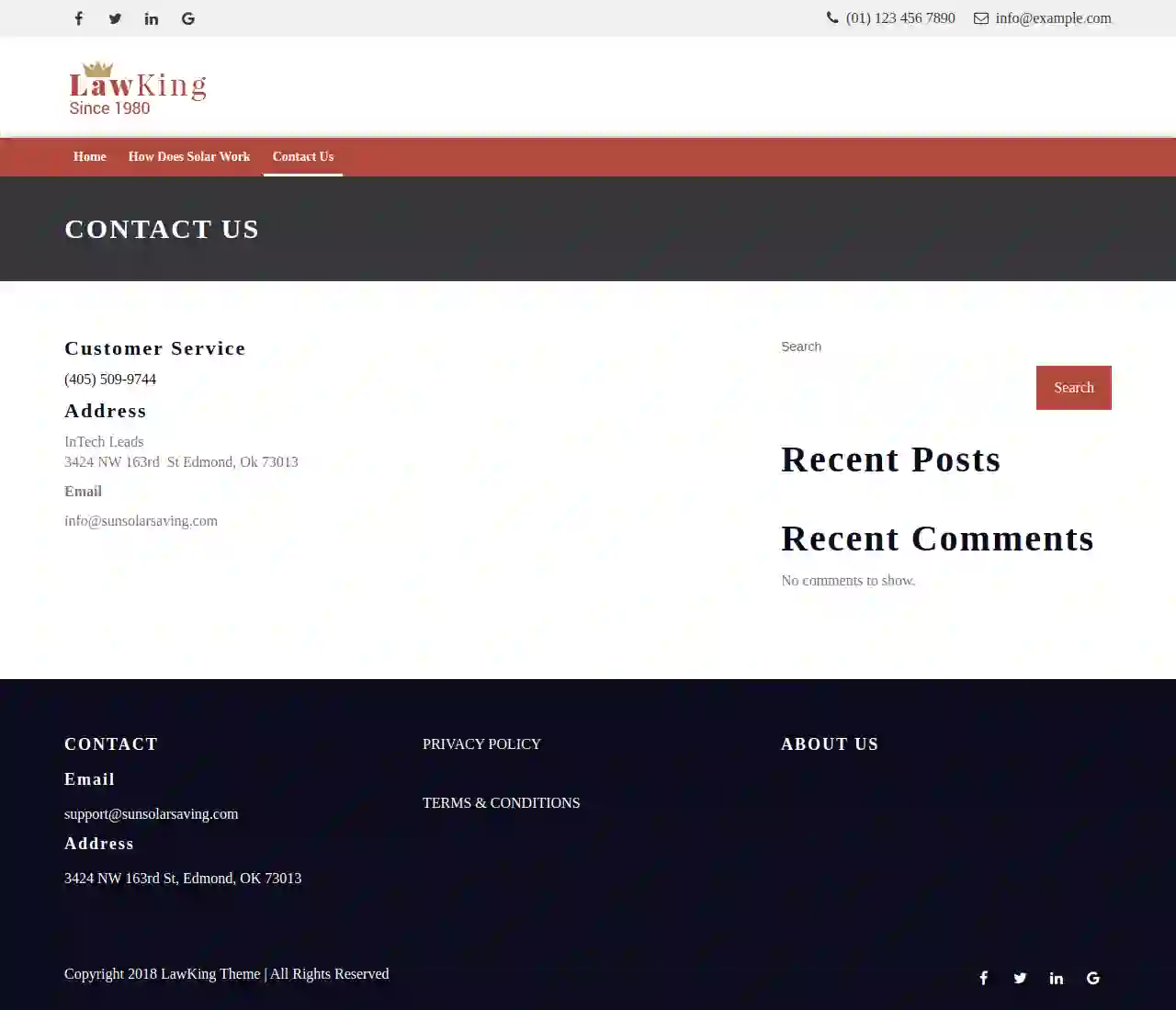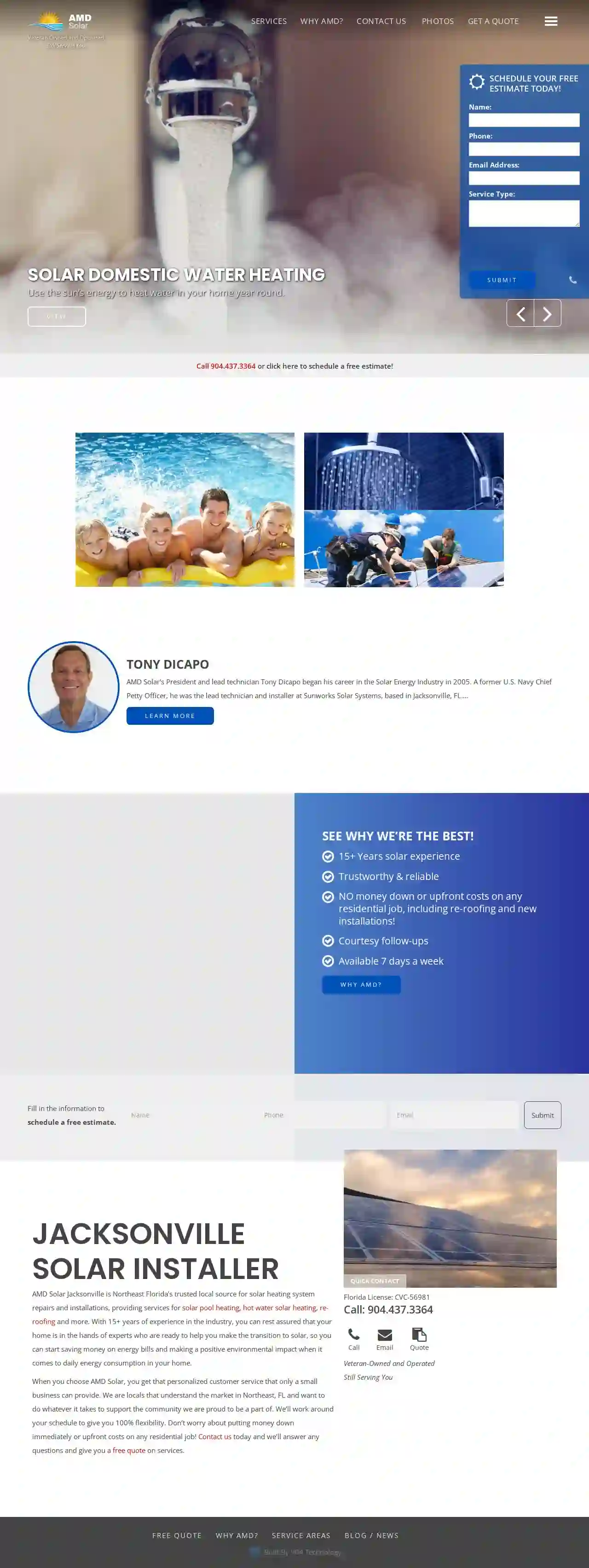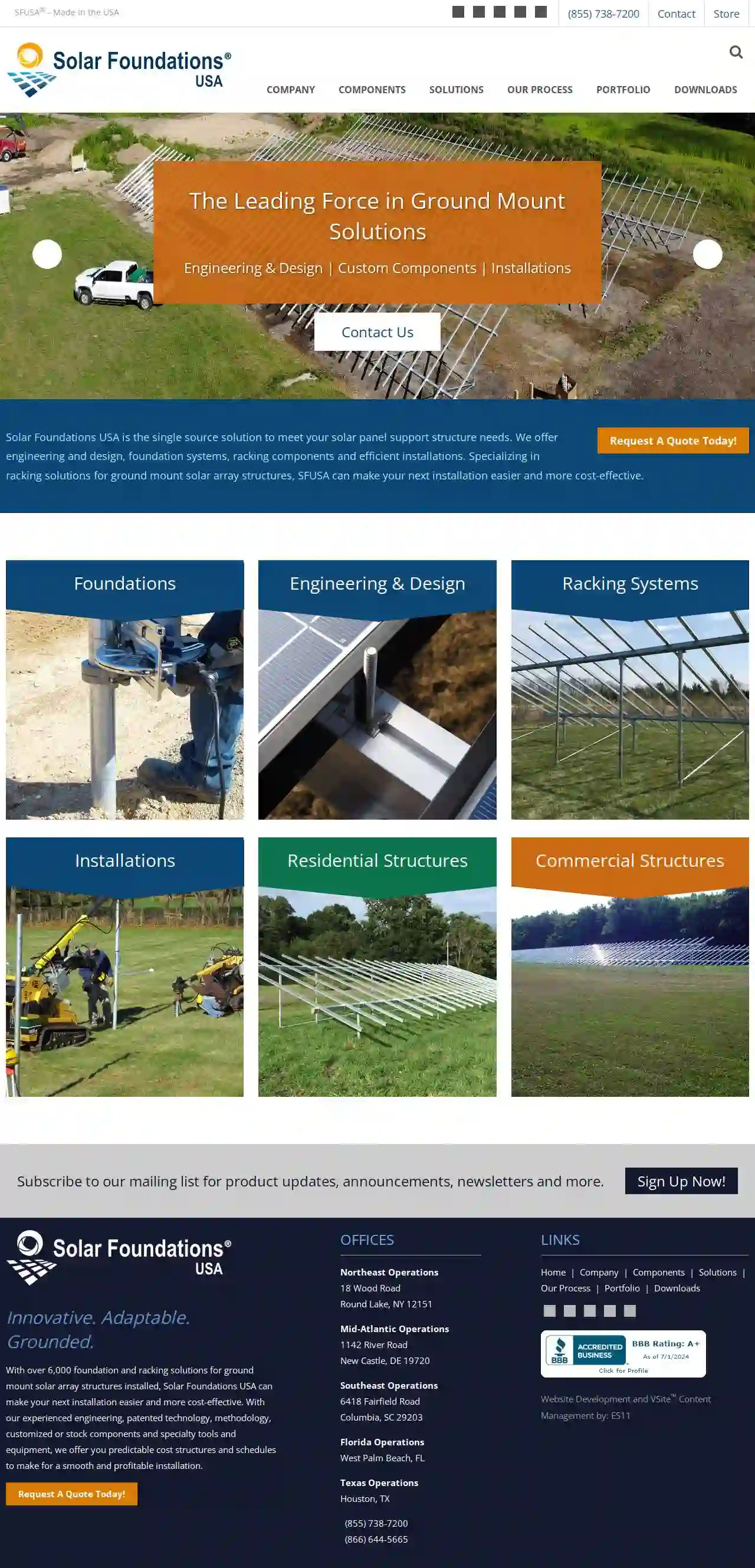Solar Installers North Carolina
Top 10 Solar Companies in North Carolina
Receive multiple Solar Companies quotes for your project today! Compare profiles, reviews, accreditations, portfolio, etc... and choose the best service.

Clean Energy Association
38 reviews12828 Willow Centre Dr Ste D # 255, Houston, TX 77066, 77066, USClean Energy Association is a locally-owned, community-oriented company dedicated to empowering homeowners with energy independence. They provide integrated solar solutions for controlling energy production and believe in the financial and environmental benefits of solar energy. Their services include solar panel installation, maintenance, and replacement, with a focus on customer satisfaction and providing a positive financial return.
- Services
- Why Us?
- Accreditations
- Our Team
- Testimonials
- Gallery
Get Quote
Sun Solar Saving
3424 NW 163rd St, Edmond, Ok 73013, 73013, USProject Sun Solar Saving is a personalized solar estimator powered by Google Earth imagery. It analyzes your roof shape and local weather patterns to create a customized solar plan. The service helps you compare finance options for your solar panels based on your results and provides a detailed savings estimate.
- Services
- Why Us?
- Accreditations
- Our Team
- Testimonials
- Gallery
Get Quote
Carolina Connections Solar Energy - North Carolina Installation & Sales
4.8134 reviews422 Huffman Mill Rd #105, Burlington, 27215, USCarolina Connections is a family-owned southern company established in 1991, serving residential homeowners looking to own clean and renewable solar-powered energy. They offer easy financing options, free consultations, award-winning service, and are licensed and insured. They also provide information on net metering and the 30% federal solar tax credit.
- Services
- Why Us?
- Accreditations
- Our Team
- Testimonials
- Gallery
Get Quote
SOLZA POWER - Solar + Roofing
3.920 reviewsN/A, USSolza Power is a leading provider of solar energy solutions, offering premium home upgrades to help families take control over rising energy costs. With a focus on using American-made solar panels, Solza Power designs custom systems tailored to each family's needs. They also assist in securing solar incentives and rebates to help pay for the system. By switching to solar energy, homeowners can lower their electric costs for good with cleaner, more affordable energy from the sun.
- Services
- Why Us?
- Accreditations
- Our Team
- Testimonials
- Gallery
Get Quote
Solar Future USA
517 reviewsSolar Future USA, Headquarters, 123 Solar Way, Beverly Hills, 90210, USSolar Future USA is a veteran-owned organization dedicated to providing clean energy solutions to both commercial and residential clients. They offer a full suite of solar energy services, including AI-powered state-of-the-art designs specific to your energy profile, a friendly team of professionals to guide you through the process, turnkey solar install with a complimentary 1-year concierge service, and a 25-year warranty including a hotline to address any urgent needs. They are licensed to operate in over 20 US states and are expanding rapidly.
- Services
- Why Us?
- Accreditations
- Our Team
- Testimonials
- Gallery
Get Quote
AMD Solar
510 reviewsJacksonville, 32207, USAMD Solar Jacksonville is a trusted local source for solar heating system repairs and installations, providing services for solar pool heating, hot water solar heating, re-roofing, and more. With 15+ years of experience in the industry, you can rest assured that your home is in the hands of experts who are ready to help you make the transition to solar, so you can start saving money on energy bills and making a positive environmental impact when it comes to daily energy consumption in your home.
- Services
- Why Us?
- Accreditations
- Our Team
- Gallery
Get Quote
My Roof Solar
3.832 reviews13465 Midway Rd, #320, 13465 Midway Rd #320, Dallas, 75244, USMy Roof Solar EPC outshines the competition with lightning-fast installations, minimal redlines, and unwavering around-the-clock support, setting the benchmark for efficiency and customer satisfaction.
- Services
- Why Us?
- Accreditations
- Our Team
- Testimonials
- Gallery
Get Quote
Freedom Solar Power - Charlotte Solar Panel Installers
514 reviewsBeverly Hills, CA, 123 Solar Way, 90210, USFreedom Solar Power is a leading provider of solar energy solutions, offering installation services, cost-effective solutions, and maintenance services for both residential and commercial clients. With a strong commitment to sustainability and renewable energy, Freedom Solar Power aims to empower individuals and businesses to harness the power of the sun, reducing their reliance on traditional energy sources and contributing to a greener future.
- Services
- Why Us?
- Accreditations
- Our Team
- Testimonials
- Gallery
Get Quote
Solar Foundations USA
Round Lake, NY, 18 Wood Road, New York, 12151, USSolar Foundations USA is a leading force in ground mount solutions, offering engineering and design, foundation systems, racking components, and efficient installations. They specialize in racking solutions for ground mount solar array structures, aiming to make installations easier and more cost-effective.
- Services
- Why Us?
- Accreditations
- Our Team
- Testimonials
- Gallery
Get Quote
8MSolar
5262 reviewsRaleigh NC, 5112 Departure Drive, Raleigh, 27616, US8MSolar is the highest rated solar panel installation company in North Carolina. We help install solar energy in North Carolina for homes, businesses and non-profits. We focus on installing Solar PV panel systems that are cutting edge, beautiful and reliable.
- Services
- Why Us?
- Accreditations
- Our Team
- Testimonials
- Gallery
Get Quote
Over 4,210+ Solar Businesses onboarded
Our solar pros operate in North Carolina and beyond!
SolarCompaniesHub has curated and vetted the Best Solar Installers arround North Carolina. Find a top & trustworthy contractor today.
Frequently Asked Questions About Solar Installers
- Monocrystalline: Made from a single silicon crystal, known for high efficiency (typically 18-22%) and sleek black appearance.
- Polycrystalline: Made from multiple silicon crystals, slightly less efficient (15-17%) but often more affordable than monocrystalline.
- Thin-film: Made from thin layers of photovoltaic material, lower efficiency (8-12%) but can be flexible and lightweight.
- String Inverters: Connect multiple panels in a series (a 'string'). A cost-effective option for simple systems, but a single panel issue can affect the entire string.
- Microinverters: Attach to each individual solar panel, maximizing energy production even if some panels are shaded. They are more expensive but offer greater efficiency and monitoring capabilities.
- Power Optimizers: Similar to microinverters, but less expensive. They optimize the output of each panel and provide individual panel monitoring, but a central inverter is still required.
- Hybrid Inverters: Combine a solar inverter with a battery charge controller, allowing for seamless integration of battery storage.
- Adequate Sunlight: Unobstructed sunlight for a significant portion of the day.
- Sufficient Space: Enough space to accommodate the desired number of panels.
- Structural Integrity: A strong roof structure capable of supporting the weight of the panels.
- Appropriate Orientation and Tilt: Ideally, the roof should face south (in the Northern Hemisphere) or north (in the Southern Hemisphere) with a tilt angle close to the latitude of your location. However, other orientations and tilts can still be effective.
What are the different types of solar panels?
What are the different types of solar inverters?
How do solar panels work?
How do I know if my roof is suitable for solar panels?
What are the different types of solar panels?
- Monocrystalline: Made from a single silicon crystal, known for high efficiency (typically 18-22%) and sleek black appearance.
- Polycrystalline: Made from multiple silicon crystals, slightly less efficient (15-17%) but often more affordable than monocrystalline.
- Thin-film: Made from thin layers of photovoltaic material, lower efficiency (8-12%) but can be flexible and lightweight.
What are the different types of solar inverters?
- String Inverters: Connect multiple panels in a series (a 'string'). A cost-effective option for simple systems, but a single panel issue can affect the entire string.
- Microinverters: Attach to each individual solar panel, maximizing energy production even if some panels are shaded. They are more expensive but offer greater efficiency and monitoring capabilities.
- Power Optimizers: Similar to microinverters, but less expensive. They optimize the output of each panel and provide individual panel monitoring, but a central inverter is still required.
- Hybrid Inverters: Combine a solar inverter with a battery charge controller, allowing for seamless integration of battery storage.
How do solar panels work?
How do I know if my roof is suitable for solar panels?
- Adequate Sunlight: Unobstructed sunlight for a significant portion of the day.
- Sufficient Space: Enough space to accommodate the desired number of panels.
- Structural Integrity: A strong roof structure capable of supporting the weight of the panels.
- Appropriate Orientation and Tilt: Ideally, the roof should face south (in the Northern Hemisphere) or north (in the Southern Hemisphere) with a tilt angle close to the latitude of your location. However, other orientations and tilts can still be effective.